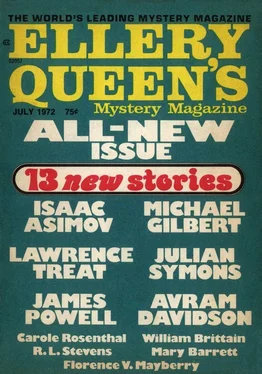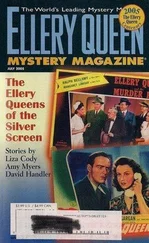Ellery Queen’s Mystery Magazine, Vol. 60, No. 1. Whole No. 344, July 1972
Здесь есть возможность читать онлайн «Ellery Queen’s Mystery Magazine, Vol. 60, No. 1. Whole No. 344, July 1972» весь текст электронной книги совершенно бесплатно (целиком полную версию без сокращений). В некоторых случаях можно слушать аудио, скачать через торрент в формате fb2 и присутствует краткое содержание. Город: New York, Год выпуска: 1972, Издательство: Davis Publications, Жанр: Классический детектив, на английском языке. Описание произведения, (предисловие) а так же отзывы посетителей доступны на портале библиотеки ЛибКат.
- Название:Ellery Queen’s Mystery Magazine, Vol. 60, No. 1. Whole No. 344, July 1972
- Автор:
- Издательство:Davis Publications
- Жанр:
- Год:1972
- Город:New York
- ISBN:нет данных
- Рейтинг книги:4 / 5. Голосов: 1
-
Избранное:Добавить в избранное
- Отзывы:
-
Ваша оценка:
- 80
- 1
- 2
- 3
- 4
- 5
Ellery Queen’s Mystery Magazine, Vol. 60, No. 1. Whole No. 344, July 1972: краткое содержание, описание и аннотация
Предлагаем к чтению аннотацию, описание, краткое содержание или предисловие (зависит от того, что написал сам автор книги «Ellery Queen’s Mystery Magazine, Vol. 60, No. 1. Whole No. 344, July 1972»). Если вы не нашли необходимую информацию о книге — напишите в комментариях, мы постараемся отыскать её.
Ellery Queen’s Mystery Magazine, Vol. 60, No. 1. Whole No. 344, July 1972 — читать онлайн бесплатно полную книгу (весь текст) целиком
Ниже представлен текст книги, разбитый по страницам. Система сохранения места последней прочитанной страницы, позволяет с удобством читать онлайн бесплатно книгу «Ellery Queen’s Mystery Magazine, Vol. 60, No. 1. Whole No. 344, July 1972», без необходимости каждый раз заново искать на чём Вы остановились. Поставьте закладку, и сможете в любой момент перейти на страницу, на которой закончили чтение.
Интервал:
Закладка:
Although it was a fine afternoon the village street was completely empty. As he walked he noted the occasional stirring of a window curtain and he knew he was not unobserved, but the silence of the early-autumn afternoon lay heavily over everything. On this occasion he had left a strangely subdued Rasselas behind.
His knock at the rectory door was unanswered. Remembering the rector saying, “We never lock our doors here,” he turned the handle and went in. The house was silent. He took a few steps along the hall, then stopped. The door on his left was ajar. He looked in. The rector was there. He was kneeling at a carved prie-dieu, as motionless as if he had been himself part of the carving. If he had heard Mr. Calder’s approach he took absolutely no notice of it. Feeling extremely foolish, Mr. Calder withdrew by the way he had come.
Walking back down the street he was visited by a recollection of his days with the Military Mission in wartime Albania. The mission had visited a remote village and had been received with the same silent disregard. They had usually been well received, and this time it puzzled them. When he returned to the village some months later Mr. Calder learned the truth. The village had caught an informer and were waiting for the mission to leave before they dealt with him. He had heard the details of what they had done to the informer, and although he was not naturally queasy it had turned his stomach.
That evening Stokes waited on them in unusual silence. When he had gone, the Colonel said, “Whatever it is, it’s tomorrow.”
“How do you know?”
“I’m told that the rector has been fasting since Thursday. Also that morning service tomorrow has been canceled, and Evensong brought forward to four o’clock. That’s when it’ll break.”
“It will be a relief,” said Mr. Calder.
“Stokes thinks you ought to leave tonight. He thinks I shall be all right, but you might not be.”
“That was thoughtful of Stokes. But I’d as soon stay. That is, unless you want to get rid of me.”
“Glad to have you,” said the Colonel. “Besides, if they see you’ve gone they may put it off. Then we shall have to start all over again.”
“Did you make contact with the number I asked you to?”
“Yes. From a public phone booth in Thetford.”
“And what was the answer?”
“It was so odd,” said the Colonel, “that I was afraid I might get It wrong, so I wrote it down.” He handed Mr. Calder a piece of paper.
Mr. Calder read it carefully, folded it up, and put it in his pocket.
“Is it good news or bad?”
“I’m not sure,” said Mr. Calder. “But I can promise you one thing. You’ll hear a sermon tomorrow which you won’t forget.”
When the rector stepped into the pulpit his face was pale and composed, but it was no longer gentle. Mr. Calder wondered how he could ever have considered him nondescript. There was a blazing conviction about the man, a fire that lit up the whole church. This was no longer the gentle St. Francis. This was Peter the Hermit, “whose eyes were a flame and whose tongue was a sword.”
He stood for a moment, upright and motionless. Then he turned his head slowly, looking from face to face in the crowded congregation, as if searching for support and guidance from his flock. When he started to speak it was in a quiet, almost conversational voice.
“The anti-Christ has raised his head once more. The Devil is at his work again. We deceived ourselves into thinking that we had dealt him a shrewd blow. We were mistaken. Our former warning has not been heeded. I fear that it will have to be repeated, and this time more strongly.”
The Colonel looked anxiously at Mr. Calder, who mouthed the word, “Wait.”
“Far from abandoning its foul work at Snettisham Manor, I have learned that it is not only continuing, but intensifying it. More of God’s creatures are being imprisoned in its cells and tortured by methods which would have shamed the Gestapo. In the name of science, mice, small rabbits, guinea pigs, and hamsters are being put to obscene and painful deaths. Yesterday a cargo of African tree beavers, harmless and friendly little animals, arrived at this — at this scientific slaughterhouse. They are to be inoculated with a virus which will first paralyze their limbs, then cause them to go mad with pain, and finally to die. The object of the experiment is to hold off the moment of death as long as possible—”
Mr. Calder, who was listening with strained attention to every word, had found it difficult to hear the closing sentence and realized that the rector was now speaking against a ground swell of noise which burst out suddenly into a roar. The rector’s voice rode over the tumult like a trumpet.
“Are we going to allow this?”
A second roar crashed out with startling violence.
“We will pull down this foul place stone by stone! We will purge what remains with fire! All who will help, follow me.”
“What do we do?” said the Colonel.
“Sit still,” said Mr. Calder.
In a moment they were alone in their pew with a hundred angry faces round them. The rector, still standing in the pulpit, quelled the storm with an upraised hand. He said, “We will have no bloodshed. We cannot fight evil with evil. Those who are not with us are against us. Enoch, take one of them. Two of you the other. Into the vestry with them.”
Mr. Calder said, “Go with it. Don’t fight.”
As they were swirled down the aisle the Colonel saw one anxious face in the crowd. He shouted, “Are you in this, too, Stokes?” The next moment they were in the vestry. The door had clanged shut and they heard the key turn in the lock. Thick walls and nine inches of stout oak cut off the sounds. They could hear the organ playing. It sounded like Miss Martin’s idea of the Battle Hymn of the Republic. A shuffling of feet. A door banging. Then silence.
“Well,” said the Colonel. “What do we do now?”
“We give them five minutes to get to the rectory. There’ll be some sort of conference there, I imagine.”
“And then?”
Mr. Calder had seated himself on a pile of hassocks and sat there, swinging his short legs. He said, “As we have five minutes to kill, maybe I’d better put you in the picture. Why don’t you sit down.”
The Colonel grunted, and subsided.
Mr. Calder said, “Hasn’t it struck you that the miracles we’ve been hearing about were of two quite different types?”
“Don’t follow you.”
“One sort was simple animal magnetism. No doubt about that. I saw the rector operating on Rasselas. Nearly hypnotized the poor dog. The other sort — well, there’s been a lot of talk about them, but I’ve heard real evidence of only two. The bells that rang themselves and the food that materialized in a locked cupboard. Isolate them from the general hysteria, and what do they amount to? You told me yourself that the bell-chamber key had once been mislaid.”
“You think someone stole it? Had a duplicate made?”
“Of course.”
“Who?”
“Oh,” said Mr. Calder Impatiently, “the person who organized the other miracle, of course. I think it’s time we got out of here, don’t you?”
“How?”
“Get someone to unlock the door. I notice they left the key in it on the other side. There must be some sane folk about. Not all the farmers were in church.”
The Colonel said, “Seeing that the nearest farm likely to be helpful to us is a good quarter of a mile away, I’d be interested to know how you intend to shout for help.”
“Follow me up that ladder,” said Mr. Calder, “and I’ll show you.”
The rector said, “Is that clear? They’ll be expecting us on the southern side, where we attacked before. So we’ll come through the woods, on the north. Stokes, can you get the Colonel’s Land Rover up that side?”
Читать дальшеИнтервал:
Закладка:
Похожие книги на «Ellery Queen’s Mystery Magazine, Vol. 60, No. 1. Whole No. 344, July 1972»
Представляем Вашему вниманию похожие книги на «Ellery Queen’s Mystery Magazine, Vol. 60, No. 1. Whole No. 344, July 1972» списком для выбора. Мы отобрали схожую по названию и смыслу литературу в надежде предоставить читателям больше вариантов отыскать новые, интересные, ещё непрочитанные произведения.
Обсуждение, отзывы о книге «Ellery Queen’s Mystery Magazine, Vol. 60, No. 1. Whole No. 344, July 1972» и просто собственные мнения читателей. Оставьте ваши комментарии, напишите, что Вы думаете о произведении, его смысле или главных героях. Укажите что конкретно понравилось, а что нет, и почему Вы так считаете.












